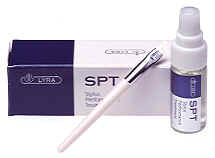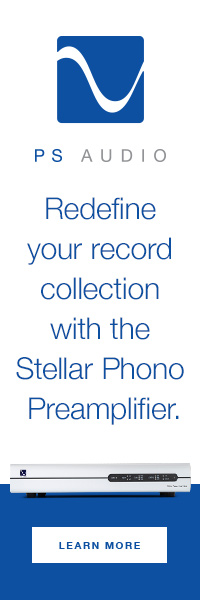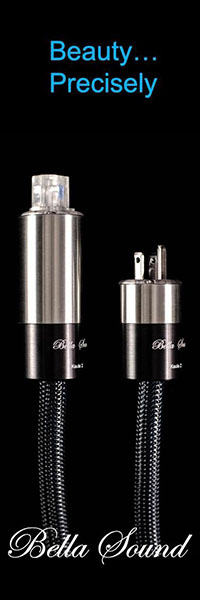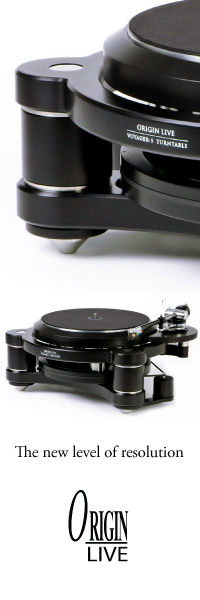Lyra SPT Stylus Cleaner/Treatment Evaluation
| Lyra SPT Stylus Cleaner/Treatment Evaluation |
| Jason Thorpe |
| 26 July 2000 |
 Specifications
Specifications
Manufacturer of Lyra:
Scan-Tech Co. Ltd.
Rowal Daita #102
3-53-14 Daita
Setagaya-ku
Tokyo 155-0033, Japan
Tel: +813-3487-3441
Fax:+813-3487-3486
connoisseur@gol.com
Distributor of Lyra in the USA:
Immedia
1717A Fourth Street
Berkeley, CA 94607, USA
Tel: 510-559-2050
Fax: 510-559-1855
Price $45 US dollars
aperkins@immediasound.com
“I suspect that some form of lubrication is at work here, as the first thing I noticed, even via the casual listening that I did at first, was a reduction in surface noise. My Shiraz cartridge is already very quiet in the groove, but there was no mistaking an extra level of silence on lead-in grooves, and between songs.”
I have to admit that this evaluation was the most subjective job that I’ve ever done. If I were to post this to RAH-E (rec-audio highend newsgroup), I’d be slapped down so hard that my ears would be ringing for days.
“How about I test a stylus cleaning fluid,” I’d say. “What I’ll do is listen to an LP after cleaning the stylus with one brand of fluid, wait 24 hours for the vinyl to re-elasticate, clean with another fluid and listen again.”
“Of course I’ll be applying the fluid,” I’d respond after my computer stopped smoking from the overload of sizzling emails. “D’you think that I’d let anybody else touch my turntable? But don’t worry, I won’t let that interfere with my objectivity. And don’t worry about the record wearing between plays. Everybody knows that vinyl doesn’t wear out.”
But the above imagined conversation certainly did give me pause in trying to figure out how to approach a review of Lyra’s cleaning fluid. This stuff comes packed in a neat, well finished box with an applicator brush and detailed instructions. Very Japanese looking. SPT, by the way, stands for Stylus Performance Treatment. The following was relayed to me by Stig the CEO of Scan-Tech, the company that produces Lyra cartridges and the SPT system:
“SPT stands for Stylus Performance Treatment. We named the stylus cleaner like that because any chemical applied to a cartridge diamond stylus will affect the sound, it is just that ours have been carefully designed to complement (improve) the sound of Lyra cartridges, and we think it also will work positively on other cartridges. The other thing we have been very careful about is to design it so it won’t dissolve or damage any glue joints between stylus and cantilever. (This cannot be said about all other products, some of which causes damage (diamonds fall out because of dissolved glue), especially if used excessively.)”
First, some system information. I used this stuff on a Roksan Shiraz (MC, low output) and an Alchemist S (MC, high output, originally produced by Sumiko, I think). Both carts were lodged at the end of an Artemiz arm, which was in turn connected to a Xerxes ‘table. Speakers are Magneplanar 1.5’s, amps cycled between a Lescon (Boothroyd Stewart) 100wpc solid-state, EAR 509 100 watt tube monoblocks and, lately, a hot-rodded Dynaco Stereo 70, wired in triode (15 whopping watts! And yes, it drives the Maggies just fine!). Sonic Frontiers SFP-1 Signature, phono stage and SFL-2 preamp finish things off. Cables are a mix of Audioquest and Kimber KCAG/KCTG. I regularly lubed myself up with Upper Canada Wheat and Light Lager.
I currently use Last Stylus Cleaner followed by Stylast using the supplied brush. Since this is my standard, I reasoned that the Lyra stuff should be compared directly against this, as comparing it against using nothing wasn’t relevant, as a clean stylus would naturally perform better than a dirty one. So a shoot-out it was to be.
First, I’d like to deal with ergonomics. Since a stylus cleaner is something that you’re going to have to deal with on at least a daily basis, if it ends up being a bitch to use, it doesn’t matter what the resulting sound is like. You’re not going to use it. This, to me, is one of the most important criteria for a product of this nature.
I have good news and bad news about the Lyra cleaner. First the good news:
It’s very easy to keep the brush clean. The applicator is a chisel-tipped paintbrush that’s about 2″ long, and has a tip about 3mm (sorry to mix imperial and metric!) across.
This brush arrangement doesn’t have the abrasive scrubbing action of the tightly packed Last brush. When applied without muting engaged, the sound is much lower in volume when using the Lyra brush. This, in my mind, is a VERY good thing, as it seems much gentler.
The instructions suggest simply rinsing the brush every five usage’s or so in clean tap water. It’s very easy to see when the white bristles get dirty, and a quick rinse really does bring it back to life. This arrangement is far superior to the Last brush, which collects hairs and dirt at an alarming rate, and has always frustrated my attempts at cleaning. I’ve often had to pick off a hair that was hanging off the end of the stylus. No such problems with the Lyra system.
While it’s very gentle on the stylus, I truly feel that it does and excellent job as a cleaner. I haven’t used a magnifying glass, but I’ve noticed dirt buildup in the past and feel that this stuff is doing at least as good a job as the Last stuff, perhaps even better.
According to the instructions, one needs to apply a small amount of the cleaner to the brush and swipe that across the stylus only. It is stressed in the instructions that great pains should be taken to avoid applying fluid to the cantilever.
Unfortunately, it’s not quite that simple. If I go into a kung-fu trance and focus all of my attention on the job, I can do it. But unless you work on the bomb squad, you will probably lack the commitment and ability to do it this way every time. Hopefully any fluid that makes it onto the cantilever won’t harden into epoxy and turn the motor into a solid unit.
One of the main reasons for the problem with applying the fluid as per the instructions is due to the length of the brush. Since I use a TT with a plinth, the stylus rides about 1.5″ above the plinth while in the armrest. This precludes getting the brush under the stylus, instead requiring me to attack it from first the right side and then the left. But the left side is a bit of a problem in that the platter gets in the way. In this regard, the Last brush is far superior. I had considered cutting down the brush to make the length shorter, but I’ve resisted this, as I have concerns about controlling such a small implement. Quiet, you in the back!
But that being said, I wouldn’t go back to the Last brush due to matters of general cleanliness. I now view the Last system as somewhat like brushing your teeth with a hairbrush. Most unhygienic.
So, I feel that the ergonomics of the Lyra system are better than that of the Last. But I do think that another brush design that would be better suited to those of us who own ‘tables with plinths would be a good idea. In all fairness, I did mention my ergonomic concerns to Jonathan Carr of Lyra, and he suggested that I decapitate the brush if I felt that it would help.
“As I’m an audio cheapskate, and financially challenged right now, I probably wouldn’t have shelled out the bucks for this stuff right now, but since I’ve tried it, I would happily recommend anybody in need of a stylus cleaner to do so.”
But how does it SOUND? That’s what you all wanna know, isn’t it? Well that prompts a question: how could it possibly sound? I mean once we accept that EVERYTHING makes a difference, even the smallest change should affect it some way, but I had first assumed that this stuff wouldn’t make any difference, as a stylus can only get so clean. This, I feel, is the best way to enter an evaluation of a new product. If you’re not expecting any changes, any that are there should be real and not imagined.
I suspect that some form of lubrication is at work here, as the first thing I noticed, even via the casual listening that I did at first, was a reduction in surface noise. My Shiraz cartridge is already very quiet in the groove, but there was no mistaking an extra level of silence on lead-in grooves, and between songs. I don’t want to underestimate this difference – it was quite dramatic, especially with the Shiraz, although still very noticeable with the Alchemist.
There’s also something going on with this cleaner that affects spacial positioning and depth of soundstage. Although frequency extremes seem to be unchanged, there’s more delineation between instruments and a greater sense of decay. I noticed this side-by-side against Stylast, by playing the same section of an album twice. Before you cry “foul”, I alternated which treatment went first, and only played each section a total of twice. The observations were fairly consistent no matter which treatment was used first.
So, I’d have to give the SPT treatment a hearty thumbs up. The price of 45U$ isn’t that bad, and there should be enough goo in the bottle to last for many years of constant use. In fact, it may well last me for the rest of your audio lifetime at the rate that I’m going through it. As I’m an audio cheapskate, and financially challenged right now, I probably wouldn’t have shelled out the bucks for this stuff right now, but since I’ve tried it, I would happily recommend anybody in need of a stylus cleaner to do so.
Postscript
After reading this over, Jonathan asked that I go back and try the SPT on dirty vinyl, scratched vinyl, 180-gram pressings, and regular pressings.
Well, I did just that, and find that my original findings hold up. The SPT didn’t make dirty records sound clean, and didn’t seem to minimize noise from scratches to any degree that I could ascertain. The reduction of surface noise was noticeable on all of the above record types. This, to me, seems to be the primary characteristic of this formulation, and a very valuable one it is!
![]()
Don’t forget to bookmark us! (CTRL-D)
Stereo Times Masthead
Publisher/Founder
Clement Perry
Editor
Dave Thomas
Senior Editors
Frank Alles, Mike Girardi, Key Kim, Russell Lichter, Terry London, Moreno Mitchell, Paul Szabady, Bill Wells, Mike Wright, Stephen Yan, and Rob Dockery
Current Contributors
David Abramson, Tim Barrall, Dave Allison, Ron Cook, Lewis Dardick, Dan Secula, Don Shaulis, Greg Simmons, Eric Teh, Greg Voth, Richard Willie, Ed Van Winkle, and Rob Dockery
Music Reviewers:
Carlos Sanchez, John Jonczyk, John Sprung and Russell Lichter
Site Management Clement Perry
Ad Designer: Martin Perry





Be the first to comment on: Lyra SPT Stylus Cleaner/Treatment Evaluation